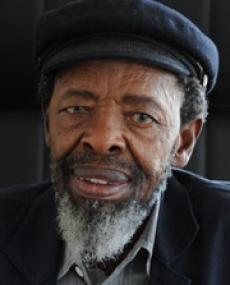
Poet, political activist, author, lecturer, exile, member of the African National Congress
Keorapetse William Kgositsile (popularly known as Bra Willie) was born in Johannesburg, Transvaal (now Gauteng). He attended Matibane High School. Influenced by European writers such as Charles Dickens and D.H. Lawrence, Kgositsile began writing as a hobby. He soon got a job at the newspaper, New Age, where he contributed poetry and news reporting. The New Age was a radical anti-Apartheid newspaper edited by political activist Ruth First. Kgositsile, being a member of the African National Congress (ANC), through the newspaper, found a platform from where he could voice his contempt for the system. In one interview he was quoted as saying: "In a situation of oppression, there are no choices beyond didactic writing: either you are a tool of oppression or an instrument of liberation."
In 1961, under the instruction of the ANC, Kgositsile left the country. He first went to Dar es Salaam, Tanzania, where he worked for Spearhead magazine. The following year, he left for the United States of America (USA), where he studied at Lincoln University, Pennsylvania University, University of New Hampshire and Columbia University. He graduated with a Master of Fine Arts in Creative Writing.
Kgositsile gained much success in the USA. He published his first collection of poems, Spirits Unchained. It was well received and he was awarded the Harlem Cultural Council Poetry Award and the National Endowment for the Arts Poetry Award. In 1971, he published his most influential collection My Name is Afrika , which established him as a leading African poet. Kgositsile wrote extensively about the American jazz scene. He also founded the Black Arts Theatre in Harlem.
In 1974 he was a founder member of the African Literature Association together with Es'kia Mphahlele, Dennis Brutus, Daniel Kunene and Mazisi Kunene, among others.
From 1962 to 1975, he lived in exile in the United States of America (USA).
In 1975, Kgositsile took up a teaching position at the University of Dar es Salaam, Tanzania. In 1977 he founded the ANC’s Department of Education, and its Department of Arts and Culture in 1983. In 1978, Kgositsile married Baleka Mbete, then a member of the ANC living in Tanzania. He took up several teaching posts in other Africans countries ”” Kenya, Botswana and Zambia.
When Apartheid ended,Kgositsile returned to South Africa in 1990. He resumed his political activism, stating that even though Apartheid was officially over, not much had changed. He constantly criticised Black leaders and the ANC government. His poem collection, When clouds clear was published the same year – the first of his work to be available in his native country.
He previously held the position of Advisor to the Minister of Arts and Culture and holds the same position for Minister Lulu Xingwana.
Kgositsile was honoured with the South African Poet Laureate Prize in 2006 by the South African Literary Awards, a project of the wRite associates, in partnership with the national Department of Arts and Culture, Sowetan and Nutrend Publishers.
In 1996 Kgositsile was inaugurated as South Africa’s first National Poet Laureate and was later a recipient of the 2008 National Order of Ikhamanga for his contribution to the field of literature.
Kgositsile is best known for taking the resources of poetry from Africa to the African Diaspora in North America and returning the resources of African-American poetry to Africa. Lebogang Mashile, one of the youngest authors ever to win the Noma Award for publishing in Africa, has expressed her indebtedness to Kgositsile, who is often seen sharing the stage with the new spoken-word poets to whom he has been passing on the baton. His influence and inspiration is also acknowledged by established authors such as Mongane Serote, Mandla Langa and Mbulelo Mzamane.
His work includes: This Way I Salute You (2004), If I Could Sing (2002), To the Bitter End (1995), Approaches to Poetry Writing (1994), The Present is a Dangerous Place to Live (1975), When the Clouds Clear (1990), Freeword - with Katiyo, Davis, & Rydstom - (1983), Heartprints (1980), Places and Bloodstains (1976), A Capsule Course in Black Poetry Writing – with Brooks, Madhubuti & Randall – (1975), The Word is Here, ed. (1973), My Name is Africa (1971), For Melba (1971), Spirits Unchained (1969). He is also the author of numerous articles, speeches, and other materials. His poems and essays have appeared in numerous journals including Guerrilla, Journal of Black Poetry, Negro Digest, The New African, Pan African Journal and Urban Review as well as in the anthologies Black Arts, Black Fire, For Malcolm andPoems Now. Worldwide appreciation of Kgositsile is evident by the presentations of his poetry, lectures on writing as a craft, revolutionary ideas on arts and culture and anti-apartheid activism.
Professor Keorapetse William Kgositsile passed away on 3 January 2018 in Johannesburg, Gauteng.